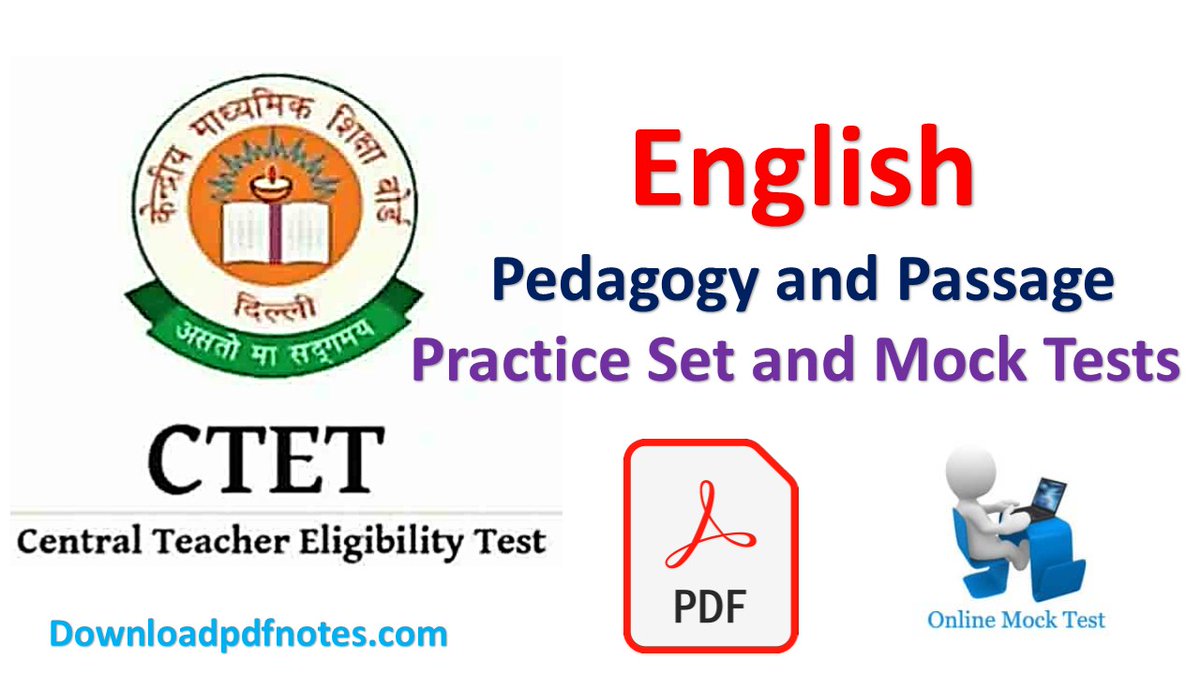CTET English Notes: English Pedagogy and Passage Practice sets | Question Paper PDF
New Study Notes of English Language, Passage and Pedagogy for CTET Exam
English Pedagogy and Passage Practice sets For CTET

English pedagogy questions and answers pdf For CTET Online Exam
Pedagogy of English is one of the most important sections of CTET Exam (Central Teacher Eligibility Test). Today we are providing some important questions (English Pedagogy Objective Questions for CTET) which are expected to be asked in upcoming CTET Online Exam.
Most Important MCQs of CTET Exam English Pedagogy
English For CTET- Pedagogy, Questions and MCQs for Upcoming Exam PDF
Reading stories, novels, comics and cartoons facilitates _____reading.
- I. intensive
- II. extensive
- III. loud
- IV. shadow
Answer: II
According to the language teaching experts the early education of a child should be in ______
- I. the First language.
- II. second language
- III. foreign language
- IV. multi-language
Answer: I
In continuous comprehensive evaluation the teacher tries to ____
- I. find out to what extent the learning objectives are achieved
- II. make the learner assess the teacher
- III. identify the special needs of the learners in a group
- IV. make the learner by cramming learning
Answer: I
Teaching of English in India as a second language has been very important and inevitable since-
- I. India is a multilingual nation
- II. Indian language books are mostly written in English
- III. English is a foreign language
- IV. English is a link and international language
Answer: IV
The alphabetic method, the phonic method, the word method and the sentence method are associated with _____
- I. Listening
- II. Speaking
- III. Reading
- IV. Writing
Answer: III
Summarising, note-making, and reporting are associated with ____skill.
- I. Reading
- II. Writing
- III. Listening
- IV. Speaking
Answer: ii
Holistic evaluation of learner’s is done by-
- I. Unit end evaluation
- II. Term-end evaluation
- III. Continuous and Comprehensive Evaluation
- IV. Month-end Evaluation
Anser: iii
The right of children to free and Compulsory Education was made in the year-
- I. 2007
- II. 2008
- III. 2009
- IV. 2010
Answer: iii
What step does a teacher have to undertake to facilitate reading the habit of a learner
- I. reading newspapers
- II. Library reading
- III. Picture and Map reading
- IV. All of the above
Answer: iv
The Right of Children to Free and Compulsory Education came into-force in-
- I. 2008
- II 2009
- III 2010
- IV 2011
Answer: ii
Effective learning takes place when the learners are :
- I. Passive
- II. quite
- III. interactive
- IV. good at preparing for the examination
Answer: iii
The best time to learn a second language is in
- I. early childhood
- II. junior school
- III. senior secondary school
- IV. college
Answer: i
Metalinguistic awareness is
- I. the ability to think and talk about language
- II. the ability to connect the distinctive sounds in words to letters
- III. understanding of the mapping principles between sounds and meaning
- IV. the ability to recognize writing from other visual marks
Answer: i
Which skills are receptive-
- I. listening and speaking
- II. istening and reading
- III. reading and writing
- IV. writing and speaking
Answer: ii
The following statements that are true about language is
- I. all languages use essentially the same number of sounds
- II. all native speakers of a language learn the basic rules of grammar in school
- III. While the different languages may use different phonemes, they all essentially share the same syntax
- IV. None of the above
Answer: iv
The statement that best describes the linguistic concept of words is
- I. words are inherent units of meaning that every child is born with,and learns to attach specific sounds to specific words
- II. words are sounds that we only attach meaning to through the context of syntax, and are by themselves devoid of useful information
- III. words are written pieces of language that are defined via long-cultural consensus, and term recorded in dictionaries to main-uniformity of expression, without which words would be arbitrary and meaningless
- IV. words are arbitrary sounds that are memorized through brute force and are associated in the mental lexicon with the word itself, its sound, and its meaning
Answer: (d)
For students to gain language skills from textbooks, textbook learning should
- I. correlate with assessment and achievement
- II. lead to using the textbook sparingly
- III. expose them to more literary reading
- IV. become more cost-effective compared to a technologically supported course
Answer: i
_________is the study of language from a cognitive and developmental law
- (a) psycholinguistics
- (b) sociolinguistics
- (c) comparative linguistics
- (d) linguistics
Answer: i
While teaching hearing-impaired students in an inclusive class, it is necessary for a teacher to
- I. make sure that they are including signs and nonverbal signals to strengthen any communication
- II. conduct regular a special class for such students
- III. be in constant touch with the parents for such students.
- IV. use cue cards to signal the teaching content
Answer: i
While translating a subject and using the translation in the mainstream curriculum, the benefit is
- I. promoting national identity
- II. enriching linguistic capability and appreciation
- III. enabling teachers who are not competent in the mainstream language to take classes.
- IV. standardizing cultural identity.
Answer: ii
The teaching of reading by associating characters or groups of characters with sounds is the __________ method.
- I. morphemic
- II. direct
- III. phonic
- IV. whole-language
Answer: iii
CALP stands for _______ Academic Language Proficiency.
- I. communicative
- II. content
- III. cognitive
- IV. controlled
Answer: iii
Teachers can remediate for the student with language learning difficulty by
- I. focusing on individual progress with individual instruction
- II. providing notes that are summarized and simplified
- III. initially giving information as reading only, no writing
- IV. conduct extra classes for the students to ‘catch up with others
Answer: i
English Pedagogy and Passage Practice sets For CTET | Question Paper PDF
👇
CTET English Notes Pedagogy pdf
|
Click here
|
Previous Year CTET English Questions and Answer PDF
|
Click here |
CTET English Passage Practice Sets PDF
|
Click here |
CTET Mock tests
|
Click here |


0 Comments
Thanks for comment!